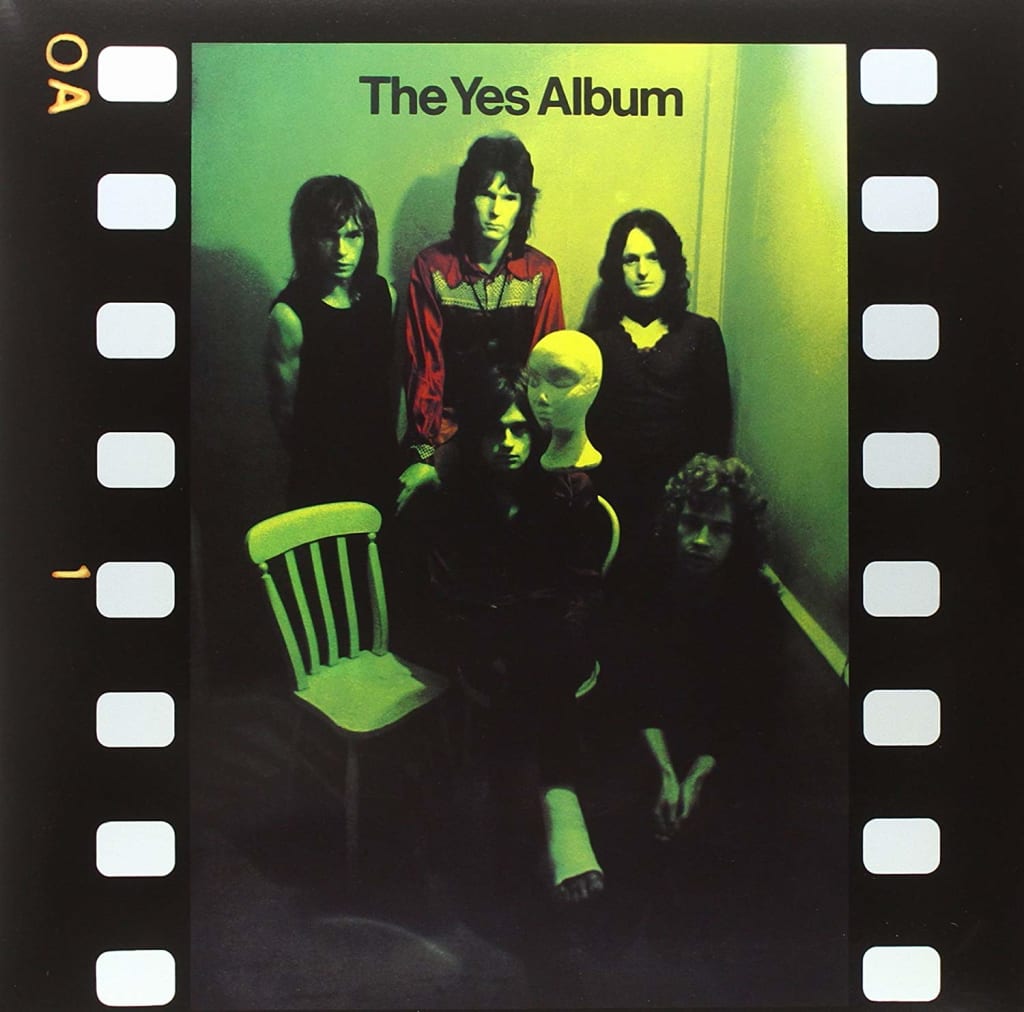'The Yes Album' - A Venture Into Perpetual Change
A Transition Into A New Era

For many Yes fans, The Yes Album is where much of what Yes is most known for really started. Part of that has to do with the recruitment of guitarist Steve Howe, who helped define their sound throughout the 1970s. He joined Jon Anderson (vocals), Bill Bruford (drums), Tony Kaye (keyboards), and Chris Squire (bass). And the songs were getting lengthier than before. Gone are the cover songs, a few of which they put on their first two albums. While the title The Yes Album is definitely an odd one given that it is their third album, perhaps it is deserving of that title if only for the fact that these tracks are all compositions solely by the members of Yes. The band wanted to move forward, and this album, the first of several produced by Eddy Offord (who was an engineer on Time and a Word) helped them reach more ears when it was released on February 19, 1971.
Yes performing "Yours Is No Disgrace" for Beat-Club in April 1971.
1. "Yours Is No Disgrace"
Though not a cover song, the opening beat of "Yours Is No Disgrace" is reminiscent of the opening theme of Gideon's Way. Despite this, the song feels very much like a fleshed out Yes composition. It is even credited to all five members of this lineup.
Tony Kaye's organ has presence that is very welcome. While live versions of this song have been great, one might long for what Kaye brought to the song. Especially that very spacey fade-out at the end. This song was a great choice for him to guest on during last year's Yes50 Tour, which one can listen to via the new release Yes: 50 Live.
Following in the steps of the first album's "Harold Land," "Yours Is No Disgrace" contains lyrics about war: "Battleships confide in me and tell me where you are, / Shining, flying, purple wolfhound, show me where you are." The music is very flamboyent, but then it becomes quieter, conveying the first stanza in a more pensive light. And then the music returns to the more flamboyent tone, though one can imagine the instruments battling out a bit at some points. All in all, "Yours Is No Disgrace" showcases the twists and turns that Yes songs can have. It is almost ten minutes long, but nothing feels like padding. It makes for a good opening to this album, and live shows over the years have shown that it works as an opening song as well as one of the closing songs.
2. "Clap"
The next track is "Clap," after all the energy of "Yours Is No Disgrace," the listener might need to take a breath before heading into the spaciness of "Starship Trooper." But this is not just a "filler" song. Recorded at a show in the Lyceum Theater on July 17, 1970, this solo highlights Steve Howe's skills as a guitarist, playing notes at an impressive pace. The song was written for Steve Howe's son Dylan, who is now 50 today! (Also interesting to note is that Dylan Howe would end up drumming for Yes on the 2017 Yestival Tour). Having "Clap" end with the applause of the audience is very fitting.
3. "Starship Trooper"
Listeners are taken back into the studio with "Starship Trooper," though they may easily forget about the studio as the music brings the stars high up above to mind. The first section of the song, "Life Seeker," is written by Jon Anderson. From the moment he sings, "Sister bluebird flying high above," one can imagine being lifted up for a cosmic adventure. Over the decades, Jon has sung the words a little bit differently, such as by substituting "Mother life" with "Mother earth." But such changes have not lessened the impact of his singing. A running theme of Yes music seems to be the nostalgic feelings of summer and winter. On their first album, "Beyond and Before" (written by Chris Squire and Clive Bailey) conveys that "The summer's too long" once winter is done. So in that instance, summer makes one think of winter memories. But here, there is a desire to remember summer, and perhaps winter, which in this case is the long season: "Speak to me of summer / Long winters longer than time can remember."
The second section of the song, "Disillusion," is credited to Chris Squire. The lyrics were previously used in another Yes song titled "For Everyone," which can be heard on the compilation album Something's Coming: The BBC Recordings 1969-1970. The music accompanying the lyrics on "Disillusion" is eccentric. And there is something thought-provoking about the lyrics, "Loneliness is a power that we possess to give or take away forever." People can feel lonely, but perhaps it is sometimes in their power to give themselves this feeling, or even make others feel lonely. There is a reprise of the "Speak to me of summer" stanza before this section ends.
The final section, "Würm," was written by Steve Howe. It originated from "Nether Street," a song by one of Howe's pre-Yes bands Bodast. The Bodast version was later released on a Steve Howe compilation titled Mothballs, which also contained songs he did with The Syndicats, The In Crowd, and Tomorrow. Howe's guitar work on both versions is very impressive. On the Yes version, the music feels as though it is leaving the planet and fading out into space, the song not quite making it to the 10-minute mark. But in live shows since this album, "Würm" has lasted much longer, with various Yes members jamming and making an epic finishes to their concerts. While it is usually the final song of the set list whenever it is performed live, there have been exceptions. In 1979, for example, it preceded several songs before the end of the show. And on the Three Albums Tour of 2013, during which Yes performed Close to the Edge, The Yes Album, and Going for the One, it had to appear earlier in the set because the albums were being performed in track list order. Despite the odd placement, a Yes concert with "Starship Trooper" in it at all is always welcome.
Yes doing three takes of "All Good People" for Beat-Club in April 1971.
4. "I've Seen All Good People"
Pretty much every Yes fan knows this song. It is the earliest of what may be considered the three best known Yes songs in pop culture (The others are "Roundabout" and "Owner of a Lonely Heart"), It is divided into two parts, beginning with the Anderson-written "Your Move." Anderson, Howe, and Squire open in a capella, singing the line that would be repeated: "I've seen all good people turn their heads each day / So satisfied I'm on my way." Howe's Portuguese guitar makes a good backdrop for "Your Move," and there is also recorder-playing by Colin Goldring of prog rock band Gnidrolog. The lyrics bring a game of chess to mind, and the words "instant karma" and "Give peace a chance" bring John Lennon and the Plastic Ono Band to mind. The swelling organ sounds toward the end, accompanied by the repeated singing of "diddit," has become somewhat iconic to listeners, even making its way into such media as Mr. Deeds and a trailer for Big Fish.
The second section, "All Good People," is credited to Chris Squire. With its funky tone, it is a big change from the mood of "Your Move." The lyrics are the aforementioned opening verses repeated over and over again. So the words are simple and easy to remember. The music itself is very fun though. To Yes fans who have heard this song time and time again in concert, it might feel odd revisiting the studio version, and hearing how the song fades out, with each verse sounding lower and lower. It has become tradition in the live setting to play the ending loudly, with audiences clapping along, and having a big finish. Again, the song is one of the more popular Yes songs, with this section making its way into the show Fringe. And there are probably a bunch of other places where it has popped up.
5. "A Venture"
The most obscure track on The Yes Album ended up being the Anderson-written "A Venture." Looking at the website Forgotten Yesterdays, it seems possible that this song was never played live before the Three Albums Tour. Interestingly, the keys at the beginning of this song sound like something that would be played by Rick Wakeman, who would replace Tony Kaye after Yes toured for this album. In fact, some bits of this song feel like they foreshadow later Yes works. Anderson's singing "hide away, hide away" brings to mind the words "Not right away, not right away" from 1972's "Close to the Edge." And there are also the opening lines: "Once a peaceful man laid his old head down by a river / Thought about his childhood life, his father and forgiver." Anderson would later rhyme "river" and "forgiver" in 1977's "Wonderous Stories." The theme of loneliness that "Disillusion" touched upon makes a return: "Better men have realised alone is not a venture." Indeed, some journeys are better with good company, and this lineup was on an adventure together.
6. "Perpetual Change"
"Perpetual Change," written by Anderson and Squire, is a strong ending to the album. There is a swirling of sounds in the bombastic opening, and then Squire's bass brings in a calmer mood, allowing Anderson to sing "I see the cold mist in the night / And watch the hills roll out of sight / I watch in every single way." Indeed, there is some good imagery in the lyrics. The band members get to jam a great amount on this, building toward a grand finale, and then fading out. The version that appears on the Yessongs live album spotlights Bruford very well. The song as a whole is a treat to see live. Some fans like to cite this song as an early instance of Yes proclaiming that they would ever evolve, and that fans would see perpetual change in terms of lineups and music styles. The line "Even in time we shall control the day" feels very fitting, seeing as how Yes music can still improve one's day.
Conclusion
For some fans, The Yes Album is the standard. The first two albums were definitely good, and people could argue that some tracks on this are overplayed compared to tracks from the first two albums. But it is evident that Yes were moving forward, venturing into new territory, and cementing themselves as a band that would embrace perpetual change.
About the Creator
Steven Shinder
Author of fantasy horror comedy novel Lemons Loom Like Rain, which is available on Amazon. You can also read excerpts at stevenshinder.com and check out facebook.com/StevenShinderStorytelling.






Comments
There are no comments for this story
Be the first to respond and start the conversation.